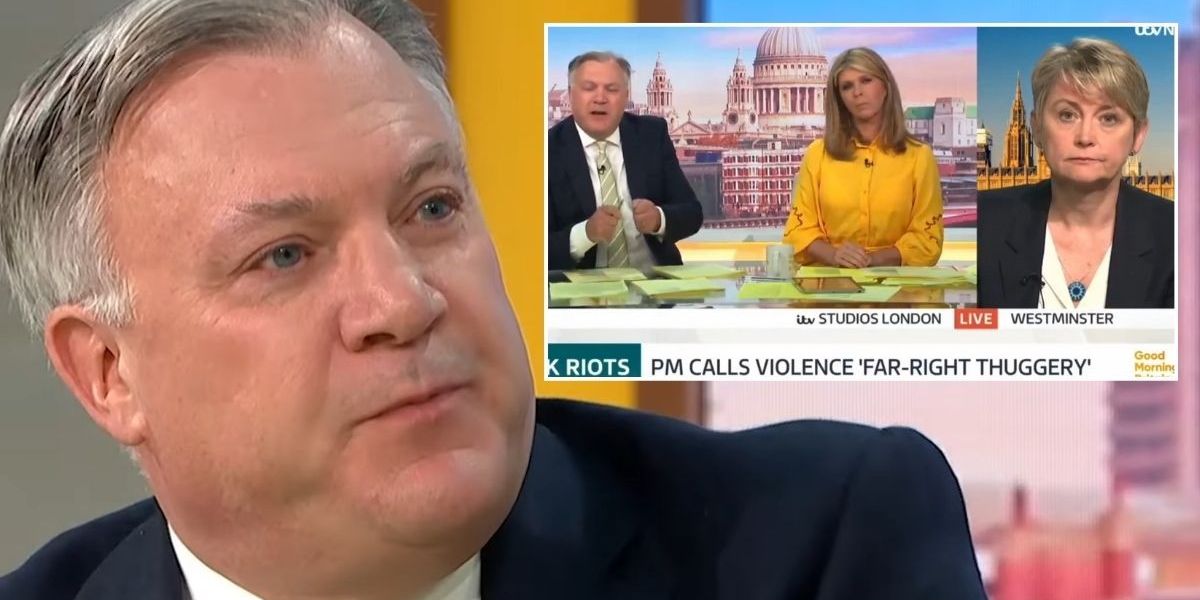Ofcom Declines to Investigate Controversial Interview Between Yvette Cooper and Ed Balls
In a recent decision that has stirred public debate, Ofcom, the UK’s communications regulator, announced it will not launch an investigation into a live television interview featuring Home Secretary Yvette Cooper and her husband, Ed Balls. The segment, which aired on ITV’s Good Morning Britain, attracted significant attention and over 16,000 complaints, primarily concerning the couple’s dynamic and the nature of the discussion.
Context of the Interview
The interview took place in August, amidst widespread riots that were causing turmoil across various cities in the UK. Ed Balls, a regular presenter on Good Morning Britain and a former Labour politician, engaged his wife in a conversation about the government’s response to the unrest. During the segment, Balls challenged Cooper on accusations of "two-tier policing," a term that suggests a disparity in law enforcement responses based on social class or race.
The couple’s unique relationship—both being prominent figures in the political landscape—added a layer of complexity to the interview. Critics argued that the personal connection could compromise the impartiality expected in political discussions, especially during a time of national crisis.
The Complaints and Ofcom’s Response
The volume of complaints received by Ofcom was unprecedented, with many viewers expressing concern over the appropriateness of the interview format. Some complaints specifically targeted the couple’s interaction, while others were directed at a separate discussion involving MP Zarah Sultana.
In light of the complaints, Ofcom conducted a review and ultimately decided against pursuing an investigation. A spokesperson for the regulator stated that the couple’s relationship was made clear during the segment and that a variety of perspectives regarding Labour’s handling of the riots were presented throughout the program. Furthermore, the spokesperson noted that the majority of the interview was conducted by co-presenter Kate Garraway, which contributed to their decision.
Guidance for Future Broadcasts
While Ofcom chose not to investigate this particular incident, they did issue guidance to ITV, emphasizing the need for careful consideration in similar interviews moving forward. The regulator highlighted the importance of maintaining due impartiality, especially in politically charged discussions involving individuals with personal relationships.
This guidance reflects a growing concern about the potential conflicts of interest that can arise when family members or close associates engage in political discourse on public platforms. The need for transparency and fairness in media coverage is paramount, particularly during sensitive times.
Reactions to Ofcom’s Decision
The decision not to investigate has drawn mixed reactions from the public and political commentators. Former Tory MP Jonathan Gullis expressed his disbelief, labeling the outcome as "laughable" and suggesting that Ofcom has undermined its credibility. He raised questions about whether a similar situation involving a different broadcaster, such as GB News, would have elicited a different response from the regulator.
Critics of Ofcom’s decision argue that it sets a concerning precedent, potentially allowing for perceived biases in political reporting. Supporters, however, contend that the decision reflects a nuanced understanding of the complexities involved in live broadcasting and the importance of context in evaluating such interviews.
Conclusion
The interview between Yvette Cooper and Ed Balls has sparked a significant conversation about media ethics, impartiality, and the role of personal relationships in political discourse. As Ofcom moves forward with its guidance for broadcasters, the implications of this incident will likely resonate within the media landscape for some time. The balance between engaging content and responsible journalism remains a critical challenge for broadcasters, particularly in an era where public trust in media is increasingly scrutinized.
